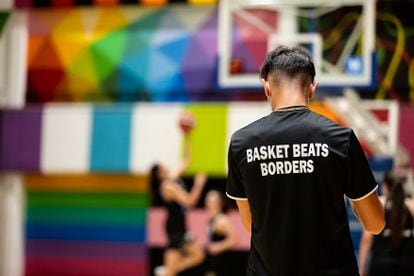Laurence Azghn, 18, scored the first basket for his team in the match between Palestine Youth Club and a team of youth players from Club Movistar Estudiantes.
His face went from uncertainty to happiness as he shot and saw that he had made a basket.
The match, which was held on the morning of June 23 at the Magariños Sports Center, did not have much history, at least from the point of view of the scoreboard.
The schoolgirls beat the women's basketball team from the Chatila refugee camp in Beirut, Lebanon, 68-33.
But the value of being there playing had many meanings for Azghn: “I feel lucky to be in Madrid, it's an opportunity for me.
Playing against a real basketball team is amazing.”
She tells it in a low voice, with a shy gesture and adds: “In Beirut we play friendly matches,
but it is difficult to train… Being here, with other girls, from other places, is something very good for us”.
Laurence is of Syrian origin, although he was born in Lebanon, and is part of the initiative
Basket Beats Borders
who's in town these days
invited by the Liga Cooperativa Basket Madrid.
Basket Beats Borders
(Basketball beats borders) began to take shape five years ago from the Chatila Youth Center, a space "self-managed" by the players themselves where they carry out educational, leisure and sports activities.
Chatila is a crowded camp, which was established in 1949 to accommodate more than 3,000 Palestinians fleeing the conflict with Israel, it grew and today it is estimated that some 30,000 live overcrowded.
The war in Syria increased the population of a territory of just one square kilometer, with frequent power outages and hardly any running water.
Rola A. Fereck, 21, is another player on the team, she is Lebanese, her hijab covers her head and a huge smile fills her face.
She started playing basketball at school, then she did it with her father and one of her sisters,
but “one day I saw a group of girls training, it seemed unusual to me because you always see boys.
So I asked and they told me that they were a team of Palestinian girls, who had a good time playing basketball together.”
She asked her father if she could join and told her “of course”, to go and to “enjoy”.
As her friend Laurence, Rola is happy to be in Madrid, an experience that she says is a “dream”.
A moment of the meeting between Estudiantes and the Palestinian team. Juan Pelegrin
With
Basket Beat Borders
the team has already traveled to other countries.
First they were in Ireland, then in Rome and in 2019 in the Basque Country, there are also plans to travel to Barcelona next year.
The team started in 2012, when Majdi Majzoub, a Palestinian painter living in Shatila, decided to set up a women's basketball club for her daughter to play with her friends.
Majzoub is a sports lover, with gray hair and beard, a deep gaze and slow speech: “I also made the team to fight against the sexism that exists in society.
Most of these players are around 18 years old, an age at which they sometimes get married and start a family.
But they are very young and it is important that from the team they empower themselves, that they train, that they go to university, and then make the decision they want about their lives,
The doors for them have many locks.
Another important one is the racism and segregation suffered by the Palestinian population in Lebanon.
Some players from Chatila had problems getting visas and were unable to travel with their teammates.
The Palestine Youth Club incorporated two Galician women who wanted to collaborate with the project, which they knew about from their coach at the Fontiñas Basketball Sports Group in Santiago de Compostela.
Laura Álvarez Domínguez is one of them, she is 28 years old and shares the state of euphoria of her new friends: “These girls are capable of overcoming so many obstacles that it is incredible, they are an example, I am delighted to be here”, and adds, “ Although we come from completely different places, there are many things that unite us, also as women, although our reality is different.
A member of the Basket Beats Borders team.Juan Pelegrin
That connection is not new in Students.
In July 2010, the collegiate club, in collaboration with the Higher Sports Council, sent a team to play various tournaments in the Palestinian cities of Hebron and Bethlehem.
Two months later, the Palestinian women's basketball team visited the Serrano street court to play against the Women's League team.
The initiative was then called “Basketball for Peace”.
Lorena Pérez, from the Fundación Estudiantes, points out that her collaboration with
Basket Beats Borders
has to do with "breaking barriers through women's basketball", and adds that they are delighted to "reconnect with a people, the Palestinians, who have always we must pay attention.”
The party ends with hugs, photos and an exchange of materials.
Majdi Majzoub smiles knowingly, the team she created ten years ago has allowed many girls to live new experiences and see other landscapes.
The one from Chatila drags a tragic history.
In 1982, in the Sabra and Chatila camps, the Lebanese Falange (of Christian origin) cold-bloodedly murdered between 500 and 6,000 refugees, according to different sources.
He did it with the connivance of the Israeli army, then commanded by what later became president Ariel Sharon, who let them do it despite being responsible for security in the area.
Majzoub points out that part of her job as a coach and trainer has to do with reversing that memory: “I have a promise.
Just as Chatila generates a bad memory for that massacre,
You can follow EL PAÍS Deportes on
and
, or sign up here to receive
our weekly newsletter
.

